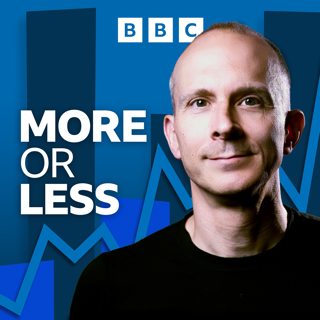
WS MoreOrLess: Is this the greatest world cup ever?
As we reach the end of the group stage are we really witnessing the greatest world cup ever? Ruth Alexander casts a sceptical eye over the statistics. She also takes a look at the possession stats to see if we’re seeing the death of tiki-taka with the help of Michael Cox from ZonalMarking.net. This programme was first broadcast on the BBC World Service.
28 Juni 20149min

WS MoreOrLess: Money for nothing?
When it comes to aid, what works best – giving people food, shelter, medicine, or just handing over cash and letting them spend it how they like? One group of researchers went to a Kenyan village to try to answer this question and to do so they also employed a new tool - randomised controlled testing. RCTs have long been the gold standard for measuring whether medical drugs work, but could they revolutionise how we measure the impact of aid?
21 Juni 20149min

WS MoreOrLess: Heads Or Tails?
Freakonomics guru Steven Levitt joins us to talk about an unusual experiment – getting people to agree to make major life decisions based on the toss of a coin. Is this really good social science? And what do the results tell us about decision making and happiness? And with 365 days in the year, it feels like a huge coincidence when we meet someone with the same birthday. But you only need 23 people to have a better than even chance that two will share a birthday. This counter-intuitive result is known as the birthday paradox, and the best place to look for proof is the World Cup, where 32 squads of 23 players provide an ideal data-set. Alex Bellos crunches the numbers for us. This programme was first broadcast on the BBC World Service.
16 Juni 20149min

Faith and Charity?
"Religion Makes People More Generous"- according to The Daily Telegraph's interpretation of a new BBC poll on charitable giving. Tim Harford investigates whether there is a link between practising a religion and whether we give. Plus: Big data - the hype says it will help deliver everything from increased corporate profits to better healthcare but are we being blinded to basic statistical lessons learned over the past two hundred years? And it feels like a huge coincidence, but you only need 23 people to have a better than even chance of meeting someone with the same birthday. This is the birthday paradox, and the best place to look for proof is the World Cup, where 32 squads of 23 players provide an ideal data-set. Alex Bellos crunches the numbers for us.
13 Juni 201428min

WS MoreOrLess: 'Spurious Correlations'
Is the divorce rate in the US state of Maine linked to margarine consumption? It's one of many pairs of statistics featured on the 'Spurious Correlations' website started recently by Tyler Vigen. We talk to him about some of the funniest correlations he's found and the serious point he's trying to make. Plus: World Cup Office Sweepstake strategy. This programme was first broadcast on the BBC World Service.
9 Juni 20149min

What's Scottish Independence Worth?
Scottish independence - yes or no? Which will line your pocket more? The Scottish government says a Yes vote will leave Scots £1,000 each better off; the UK treasury says a No vote means a £1,400 bonus for Scots. More or Less looks at exactly what these claims mean, the key assumptions underlying them, and asks whether either number is likely to be accurate. Plus: the "zombie" statistic that each year 100,000 Christians are martyred around the world; getting people to agree to make major life decisions based on the toss of a coin and World Cup Office Sweepstake strategy.
6 Juni 201428min

WS MoreOrLess: The Piketty Affair
Did 'rock-star' French economist Thomas Piketty get his numbers wrong? His theories about rising inequality and the increasing importance of capital have been the talk of the economic and political worlds this year. And part of their power has been the massive amount of data Piketty has brought together to back them. But the Financial Times claims to have found significant problems with Piketty's data on wealth. Tim Harford examines the FT's claims and Thomas Piketty's response. This programme was first broadcast on the BBC World Service.
2 Juni 20149min

The Piketty Affair
Did 'rock-star' French economist Thomas Piketty get his numbers wrong? His theories about rising inequality and the increasing importance of capital have been the talk of the economic and political worlds this year. And part of their appeal has been the massive amount of data Piketty has brought together to back them. But the Financial Times claims to have found significant problems with Piketty's data on wealth, and says this undermines his claims about rising inequality. Tim Harford examines the FT's claims and Thomas Piketty's response. Plus: is as much land given over to golf courses as housing in England; is racism on the rise in Britain; and should we be concerned that several young men who have died recently were players of the video game Call of Duty?
30 Maj 201427min





















